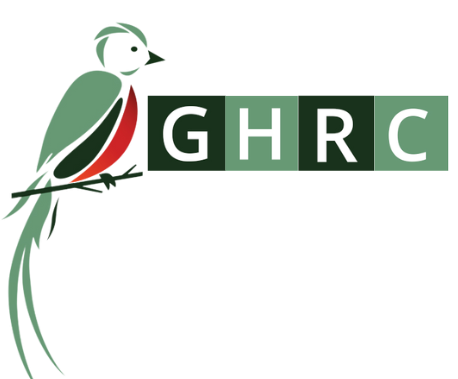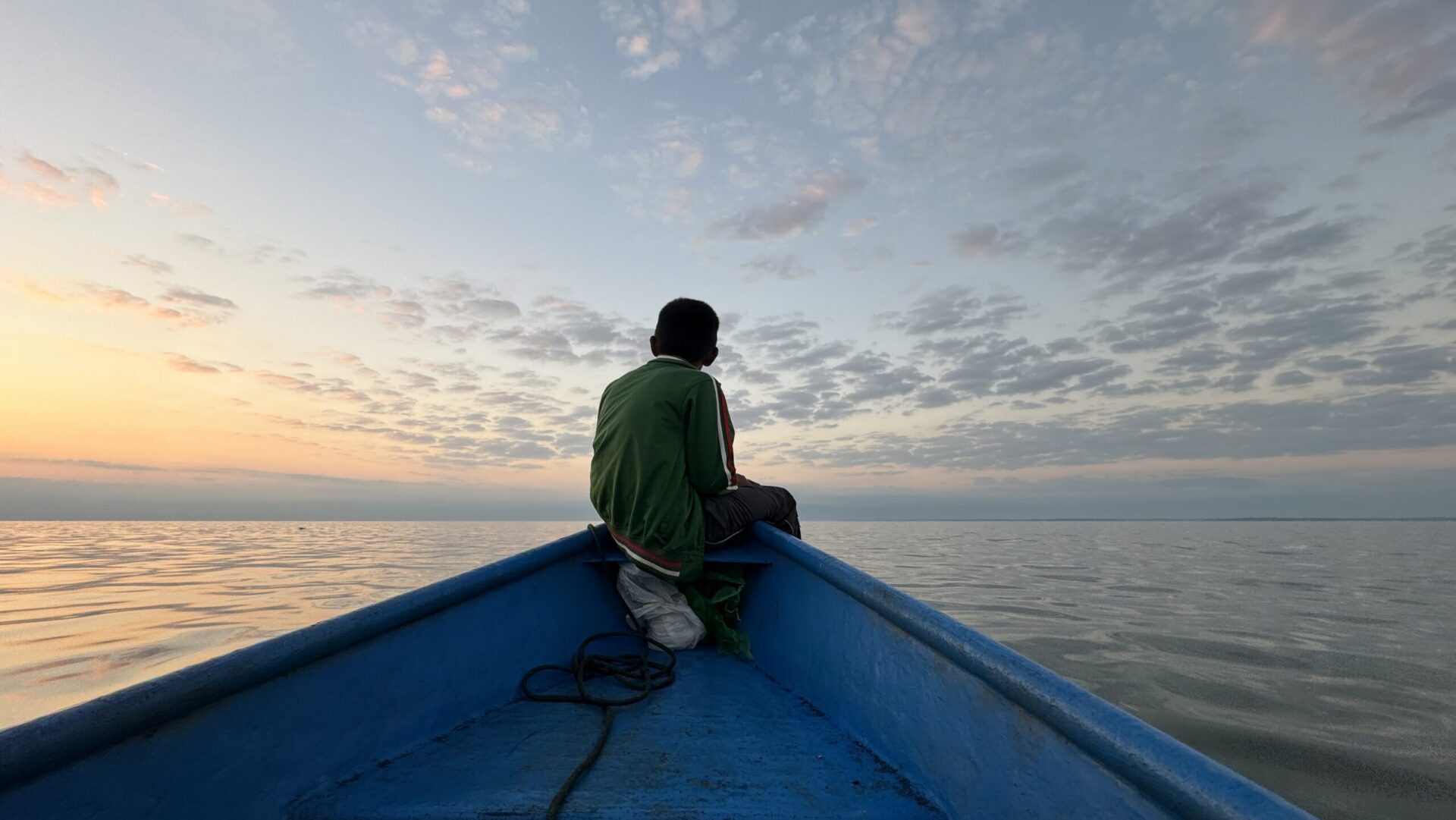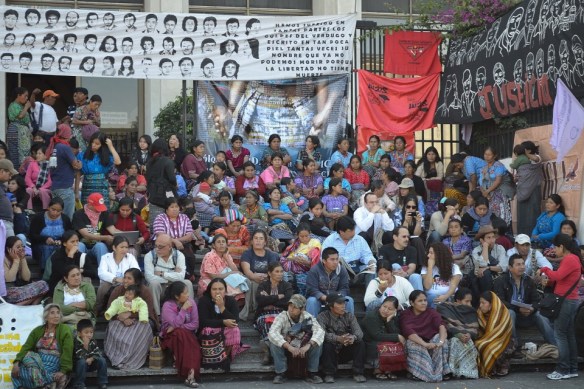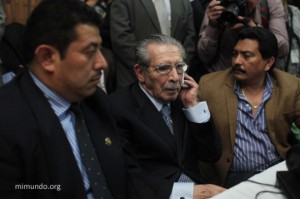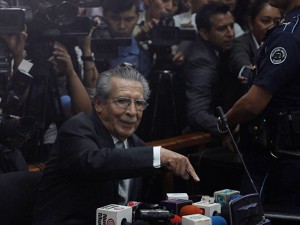 On May 10, 2013, Guatemala’s former dictator, Efraín Ríos Montt, became the first head of state in Latin America to be convicted in domestic courts of genocide and crimes against humanity. After a year of delays by the defense, the case went to trial on March 19, 2013. However, the guilty verdict was annulled just 10 days later by Guatemala’s Constitutional Court on questionable legal grounds.
On May 10, 2013, Guatemala’s former dictator, Efraín Ríos Montt, became the first head of state in Latin America to be convicted in domestic courts of genocide and crimes against humanity. After a year of delays by the defense, the case went to trial on March 19, 2013. However, the guilty verdict was annulled just 10 days later by Guatemala’s Constitutional Court on questionable legal grounds.
The original charges identified Montt and José Mauricio Rodríguez Sánchez, the director of Military Intelligence under Montt, as the intellectual authors of the crimes committed by armed forces in 1982-83 in Guatemala’s Ixil Triangle (San Juan Cotzal, San Gaspar Chajúl and Santa María Nebaj) in the department of El Quiché. They were charged with the forced displacement of 29,000, the deaths of 1,771 in 11 massacres, as well as acts of torture and 1,485 acts of sexual violence. Rodríguez was absolved of all crimes.
On October 22, 2013, the Guatemalan Constitutional Court asked lower courts to reconsider Rios Montt’s right to protection under a defunct 1986 amnesty law. Then, in early November of 2013, a court official announced that the trial would not be resumed until January of 2015, stating that court judges are “busy with other cases in 2014.” On November 6, 2013, prosecutors in the case presented a petition before the Inter-American Commission on Human Rights (IACHR) in Washington, DC, to reinforce the original conviction of 80 years in prison.
After a 19-month delay, a retrial was set to begin on January 5, 2015. However, after a series of delays, the proceedings against Guatemala´s former dictator and his head of national intelligence were suspended almost as soon as they began. Now, the trial remains indefinitely suspended until a new tribunal is formed.
To read more about the Genocide in the Ixil Triangle, click here.
PBS aired a segment on the use of forensic science to document charges of genocide against Ríos Montt:
How to Stay Informed
- We will post frequent updates, articles, analysis and photos on our Facebook page.
- Twitter @GHRCUSA, @guatejustice
- Para información en español: véase el blog de Prensa Comunitaria
Background
The decision to charge Ríos Montt and Rodríguez Sánchez and proceed to a full trial has been a historic step in a decade-long quest for justice for the egregious crimes against humanity that were committed in the early 1980s. Ríos Montt, who took power in a military coup in March 1982, oversaw a brutal scorched earth policy in Guatemala’s indigenous highland regions. His 17 months in power have become widely recognized as the most violent period in all of Guatemala’s 36-year conflict.
In the initial proceeding, it took over two hours for the government’s prosecutor to list the charges against Ríos Montt. The legal justification for the case is based on Ríos Montt’s command responsibility: as leader of the military high command, he “authorized, created, designed and supervised” the military’s counterinsurgency strategy, which targeted the civilian population in the indigenous highlands. Ríos Montt was in the direct chain of command of all military units with authority over those who carried out the crimes. He was constantly informed about what happened in the field, and he did nothing to avoid the crimes, to prevent future abuses, or to hold the perpetrators accountable. Furthermore, the state policy of violence was carried out against a specific ethnic group, the Ixil Maya, declaring them internal enemies that needed to be “destroyed,” which constituted genocide.
Evidence for Guatemala’s strict chain of command and the participation of top government officials in military activity has been repeatedly demonstrated by declassified Guatemalan and US documents. The prosecution was able to use as evidence military strategy plans such as Operación Sofía [PDF], Plan Victoria ’82 and Plan Firmenza ’83, an option made possible only after years of advocacy by national and international organizations to gain access to evidence of the military’s strategy and patterns of abuse. The others charged in the genocide case, Ríos Montt’s Army Chief of Staff Hector Mario Lopez Fuentes and Defense Minister Oscar Humberto Mejia Víctores, were ordered to appear in court last year but their evidentiary hearings were both postponed due to health issues.
This process began 13 years ago, when Nobel laureate Rigoberta Menchú Tum first brought charges of genocide,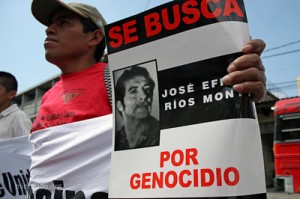 terrorism and torture against eight former political and military officials — including Ríos Montt — to the Spanish National Court, based on Spain’s recognition of universal jurisdiction. Victim organizations in Guatemala, such as the Association for Justice and Reconciliation (AJR), with the legal support of the Center for Human Rights Legal Action (CALDH), also brought a case against Ríos Montt and his military high command in 2001 in Guatemalan courts. While there was little advancement in the Guatemalan case, a Spanish judge issued international arrest warrants for all eight accused there in 2006.
terrorism and torture against eight former political and military officials — including Ríos Montt — to the Spanish National Court, based on Spain’s recognition of universal jurisdiction. Victim organizations in Guatemala, such as the Association for Justice and Reconciliation (AJR), with the legal support of the Center for Human Rights Legal Action (CALDH), also brought a case against Ríos Montt and his military high command in 2001 in Guatemalan courts. While there was little advancement in the Guatemalan case, a Spanish judge issued international arrest warrants for all eight accused there in 2006.
Ríos Montt was elected to Congress in 2007, avoiding any possibility of being charged in Guatemala. Organizations continued to build a case against him and pushed for legal action. When his immunity came to an end on January 14, 2012, he was promptly subpoenaed. Recently elected president and former general, Otto Pérez Molina, was a Major during Montt’s regime and was in a command position in the Ixil Triangle where the genocide was carried out. While he has not been charged in connection to the crimes committed there, he has been named in a separate case [PDF] as the intellectual author in the torture and forced disappearance of indigenous guerrilla leader Everardo Bámaca. 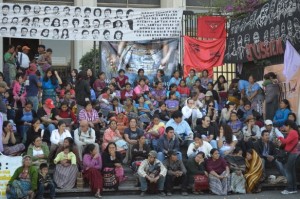
On Friday May 10, at approximately 6:30PM, Judge Yassmin Barrios declared General Efraín Ríos Montt guilty of genocide and crimes against humanity. “Justice is a right for the victims; these acts should never happen again,” she stated.
Rios Montt was found guilty of masterminding and overseeing the massacre of 1,771 Ixil Mayans in the department of El Quiche, as well as the forced displacement of 29,000, and 1,485 acts of sexual violence and acts of torture. He was sentenced to 80 years in prison and was ordered into police custody. His director of Military Intelligence, Jose Mauricio Rodriguez Sanchez, was absolved of both crimes.
During a one hour statement, Judge Barrios recounted evidence of the indiscriminate massacres committed against the civilian Ixil population, systematic physical and psychological control meant to destroy the social fabric of the Ixil culture. She noted the brutal use of sexual violence. These acts were carried out as state policy and destroyed 5.5% of the Ixil population.
Over the course of the trial, 100 survivors testified in the trial which began on March 19. They were joined by dozens of expert witnesses. In closing arguments yesterday, Benjamin Jeronimo, a survivor and representative of the Association for Justice and Reconciliation, stated: “We are not looking for vengeance; we are looking for a true peace with justice, with respect, with equality, with dignity, that is why we are here.”
The historic trial was thrown into disarray when the guilty verdict was annulled just 10 days later by Guatemala’s Constitutional Court. The verdict was thrown out on questionable legal grounds.
On October 22, 2013, the Guatemalan Constitutional Court issued another ruling asking lower courts to reconsider Rios Montt’s right to protection under a defunct 1986 amnesty law.
Then, in early November of 2013, a court official announced that the trial would not be resumed until January of 2015, stating that court judges are “busy with other cases in 2014.” On November 6, 2013, prosecutors in the case presented a petition before the Inter-American Commission on Human Rights (IACHR) in Washington, DC, to reinforce the original conviction of 80 years in prison. Prosecutors and representatives of the Ixil community continue to call on the international community to put pressure on the national courts.
